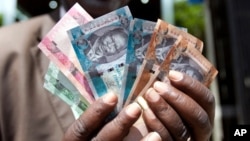The sharp decrease in the value of the South Sudanese pound against the U.S. dollar is posing challenges for South Sudanese who live outside the country and depend on remittances or income from back home.
Betty Drasa, who has lived in Nairobi for more than 10 years and supports herself by working as a seamstress, is one of those who are struggling.
The single mother of four makes tablecloths and dresses and sends them to Juba to be sold in Konyo Konyo market.
Clients pay for her goods in South Sudanese pounds, Drasa exchanges them for U.S. dollars.
But since South Sudan erupted in conflict in December 2013, Drasa says her work is not bringing in the same income as before - especially too as the dollar strengthens in world markets.
"These days, I send, they buy, but the exchange rate is very high," she said. "So now, when I exchange it, it doesn't help me here - not like before."
Black market rates
It takes 900 South Sudanese pounds (SSP) to buy $100 on the black market.
The official exchange rate, set by the South Sudanese Central Bank, is 316 SSP TO $100. But to get that rate, Drasa would have to go to the Central Bank in Juba.
Christen Jumi, the chair of the South Sudan Women’s Association In Kenya, says the plummeting exchange rate affects most South Sudanese families living in Kenya.
"Our men, most of them are working in South Sudan," Jumi said. "They used to change the money and send it to us. We've come to notice that our money is not coming the way it used to come, and when we ask our husbands they say, 'OK, the rates have gone up and our salary is not that much.'"
Jumi says some South Sudanese families have been forced to return to Kakuma refugee camp in northwestern Kenya, where they at least receive basic social services.
"They could not pay the rent, the children could not go to school, even food is a problem," she said. "In our area four families moved - they sold their things and they went."
Multi-tiered problem
The economic problems facing South Sudan are many.
The conflict in South Sudan has made trading partners wary of bringing in goods to the country, which relies heavily on imports.
The dollar has gained strength in world markets over the past year as the U.S. economy improves and the fallout has hit South Sudan.
Global oil prices have fallen sharply. Oil output in South Sudan has plummeted because of the conflict. Oil is South Sudan's biggest export and brings in almost all of the government's revenues.
South Sudan's conflict forced the shut-down of oil facilities in Unity state, leaving only one state - Upper Nile, where fighting is still ongoing - to produce oil.
Platts commodities information service says South Sudan exported the equivalent of 141,925 barrels of crude per day last month.
In 2012, according to the U.S. Energy Information Administration, South Sudan produced 250,000 barrels per day.
Karin Zeitvogel contributed to this article.




